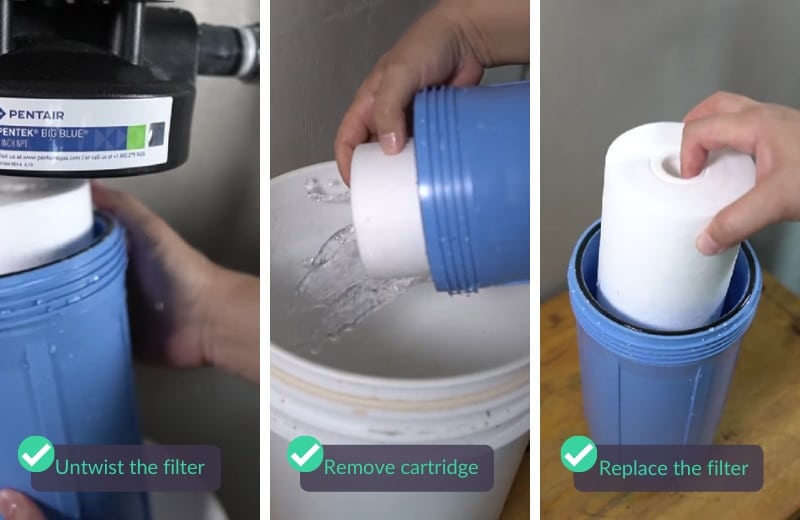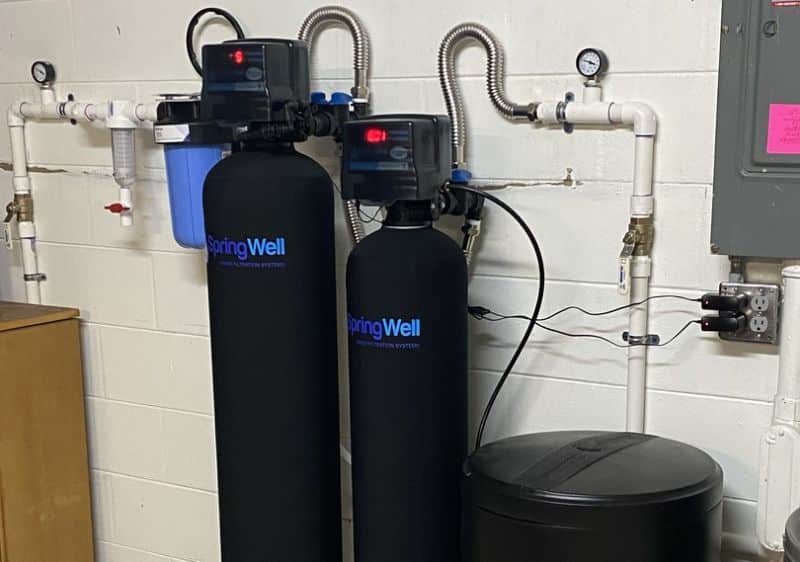Well water filters become clogged with contaminants like sediment, iron, and dissolved minerals after so many months of use.
In this guide, we’ve shared the answer to the question, “How often should I change a well water filter?”
📌 Key Takeaways:
- You should change a well water filter every 6-12 months.
- You might need to replace a well water filter earlier than expected if your water quality is poor, you use more water than average, or the filter is a certain type.
- Check the information in your user manual for the exact dates to change the filter.
Table of Contents
📆 When Should You Replace A Well Water Filter?
The average well water filter has a lifespan of 6 to 12 months.
That means the filter will last up to 1 year before it needs to be replaced.
Some well water filters have shorter lifespans – as little as 3 months – so it’s important to follow the manufacturer’s instructions carefully.

📋 Factors Affecting Well Water Filter Lifespan
We’ve listed the factors affecting the lifespan of a well water filter below.
Filter Size & Surface Area
The size and surface area of a filter determine the available media space to trap contaminants. The more space available, the greater number of contaminants the filter can trap before the media becomes saturated and the filter needs to be changed.
There are a few filter sizes usually found in whole house water filter systems for wells:
- 2.5 x 20 inches
- 4.5 x 10 inches
- 4.5 x 20 inches
The largest filters (4.5 x 20 inches) are likely to last several months longer than the smallest filters (2.5 x 20 inches) due to their additional media capacity.
Smaller filters may also reduce flow rate when used in a whole house water filter, so we recommend sizing up to suit your household size and water usage if your budget allows.
If you’re considering an under-sink water filter to treat your well water, these water filters have even shorter lifespans due to their reduced size (usually half the size of whole home water filters).
Filter Type
Different types of well water filters have different contaminant removal processes, different outcomes, and different lifespans.
Some filters are capable of trapping a greater range of contaminants than others. These filters become depleted at a faster rate because the media is clogged more heavily.
Let’s take a look at the most common well water filter types and their predicted lifespans:
Sediment Filters
Well sediment filters are used as a first-stage filter in a whole house water filter for well water. These filters remove large particles of sediment that could damage your plumbing or clog later filter stages.

Cartridge Sediment Filters
The average lifespan of a cartridge sediment filter is 3-6 months, depending on the filter capacity, your water’s sediment quantity, and the media’s micron size. Some well sediment filters of this kind may last up to 12 months.
Spin-down Sediment Filter
A spin-down sediment filter is a type of sediment filter that can be flushed, cleaned,, and reused, extending its lifespan. Most spin-down filters last 6-12 months.
Activated Carbon Filters
Activated carbon filters are sometimes used to treat well water in a whole house water filter system. These filters reduce tastes and chemicals like pesticides and herbicides in drinking water.
The average lifespan of an activated carbon filter is 12 months.
KDF Filters
Thanks to their ability to reduce heavy metals, iron, hydrogen sulfide, nitrates, and more, KDF filters are popular choices for well water filtration systems.
The lifespan of a KDF filter varies from filter to filter (there are several types of KDF media available). On average, KDF filters need to be replaced every 1-2 years.
Iron Filters
Iron filters trap ferrous iron, manganese, and sulfur in well water. These filters are often paired with sediment filters to target most sediment and dissolved minerals.
An iron filter lasts up to 12 months, depending on your water’s iron content.

UV Purifiers
UV purifiers aren’t typical filters – they use ultraviolet light to kill bacteria, viruses, and other living pathogens in drinking water. They’re commonly featured as the final stage in a whole house water filter for wells.
You’ll need to replace the bulb in a UV water purifier every 12 months.
Reverse Osmosis Filters
Reverse osmosis systems for well water combine multiple filter stages to target a range of common contaminants in well water.
With correct pre-filtration, a reverse osmosis membrane should last up to 2 years.

Ultrafiltration Filters
An ultrafiltration filter uses a similar membrane separation process as reverse osmosis, which removes the majority of dissolved contaminants from water.
The average lifespan of an ultrafiltration membrane is 6-24 months.
Read Our Reviews:
- Read about the most efficient iron filters for well water in 2024
- Ensure pathogen free water with one of these top UV water purifier systems for homeowners
- See the 4 best whole home RO filtration systems for well owners
- Our overall favorite whole house water filters for private wells
Your Water Quality
The quality of your well water – or the number of contaminants and dissolved solids that your water contains – determines how long a filter will last.
📌 The more contaminated your water, the faster a filter will become clogged. Once the filter media is clogged, it won’t be able to effectively trap any more contaminants, and a replacement filter will be needed.
What affects your water quality?
There are a few things, including your local geology and the depth of your well (generally, the deeper the well, the more “filtered” the water will be due to having more layers of rocks and soil to travel through before reaching the aquifer).
Some of the factors that contribute to poor-quality well water are:
- Flooding or drought – Especially if you have a shallow well, flooding or excess rain could cause surface contaminants to be washed into your well. On the other end, an extended period of drought could result in a higher concentration of contaminants in your water due to a lack of water in the aquifer.
- Well reconstruction or maintenance – Professional work on your well could cause the ground to shift around the well, and repairs to well components could allow sediment and other debris to leak into the well system.
- New pressure tank – A new pressure tank installation may allow debris to get into your plumbing system, causing your well water filters to clog at a faster rate.

Your Water Usage
When a well water filter manufacturer tests the longevity of their product, they predict how often the filter will be used per day.
If your water usage is higher than the manufacturer’s predicted customer water use, you’ll need a new filter more frequently.
Why? Because the filter will be exposed to more water – and more contaminants – than expected, causing it to clog at a faster rate.
Equally, if you use less water than most people, you might get slightly longer out of your water filter – but don’t use it for much longer than advised in the manufacturer’s manual to avoid bacteria buildup.
📝 How to Know When To Change A Well Filter
Signs that you need to change your well filter include:
- Reduced flow rate – A filtered water system may reduce flow rate when it’s installed, but if your water pressure and flow drops noticeably, it’s a sign to change the filter.
- Poor-tasting or smelling water – Water that tastes or smells bad probably contains the contaminants that your filter is supposed to remove, telling you that a new filter is needed.
- Dirty-looking water – Your water might look dirty because it contains contaminants that are normally removed, or because it has been re-contaminated with impurities from the filter media. These are both signs that you need to change the filter ASAP.
Don’t wait until you notice all these signs before you change your well filter.
We strongly advise making a note of exactly when you’ll need a new filter to make sure you’re following the manufacturer’s recommendations.
Many harmful contaminants are invisible, so there’s no guarantee that your water quality will change when the old filter becomes ineffective.
🔂 How to Change A Well Water Filter
We’ve shared a step-by-step guide for changing a whole house well water filter, which you can find here.
If you just want to know the basic steps involved in this task, read on.
- Switch off your whole house water supply by turning the water shut-off valve, then open a faucet to relieve water pressure.
- Locate the filter housing and twist the housing off the main unit.
- Remove the old filter and replace it with the new filter.
- Screw the filter housing back onto the main unit.
- Turn your water supply on and open a faucet.
- Check for leaks.

🤔 Do All Well Water Filters Need Changing?
The answer is yes – but some systems have longer filter lifespans than others.
If you hate the idea of maintenance, look at a tank-based whole house water filter system. Tank-based systems are pre-loaded with media, which – due to the tank’s large size – usually lasts at least 5 years before the entire media needs to be replaced.
Tank-based water filters are often $200-$500 more expensive than cartridge-based systems because you don’t have to change the water filter as frequently.

❔ How Often To Change The Filter In A Well System: FAQ
What happens if you don’t change a well water filter?
If you don’t change a well water filter, you’ll probably notice a reduction in water pressure in your plumbing, and you might end up drinking contaminants that the filter is no longer capable of removing. Even worse, your filter might accumulate bacteria, which could make you sick.
How do you know when to change your well filter?
You’ll know when to change your well filter because your water flow rate will reduce noticeably and the taste, appearance, and smell of your water will become poorer quality. To be absolutely certain when to replace your well water filter, make a note in your calendar when you install the filter.
How long can you go without changing your water filter?
You can go 3-12 months without changing your filter, depending on the filter’s lifespan. It’s not worth trying to extend the lifespan of your water filter as much as possible – this could result in bacteria accumulation in the filter, which would make you sick.
Which well water filters last longest?
The longest-lasting well water filters are KDF filters and carbon filters – but only if these filters are protected by a sediment pre-filter. You could also consider tank-based filters that are loaded with a media, which typically lasts 5-10 years or longer.
How long does an unused well water filter last?
Unused well water filters have no expiry date. However, if you use your filter for a while, then stop using it for a few weeks, that doesn’t mean you can keep the filter for longer without replacing it. Contaminants will have already accumulated in the filter media, and there’s a likelihood of bacteria buildup, regardless of whether or not the filter is in use.
How long do water filters really last?
Most water filters really do last as long as the manufacturer claims – but there are a few factors that may affect the filter’s lifespan, including your water use and water quality. In some cases, you might need to replace your filter 1 or 2 months earlier than expected.
